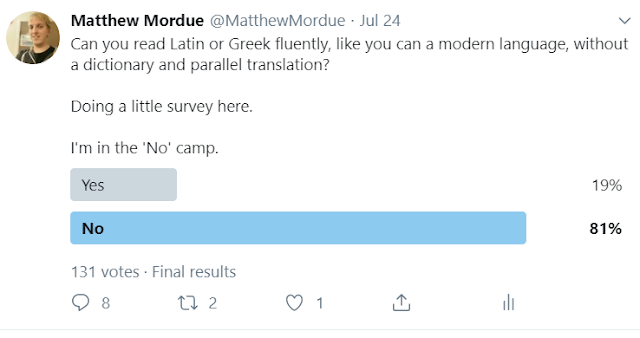Classics
Students and Latin Proficiency
I started learning Latin at 19, and while I’ve read
hundreds of lines and devoted many years to improving my skills, I still don’t
consider myself fluent. For many years, this was something which always bugged
me, and I thought maybe I was incompetent or just really bad at learning languages.
However, I’ve learnt over the years that many other Classics students have the
same struggles which I faced in my studies, it’s just not something I commonly
see expressed or talked about. To be fair, my evidence has been anecdotal: I
heard such stories when talking to close friends or those who I’ve met at
conferences. Consequently, it was something I always thought a lot about, but
since I don’t believe there’s much or any research on the topic, I would never
actually talk seriously about.
However, one day I
decided to run a poll on Twitter to try and get some more concrete evidence. The
statistics are of course not completely reliable, because although my Twitter
is almost entirely academic and not really for personal use like my Facebook,
there probably have been users who voted either way and aren’t Classics
students or researchers. Some may have studied Latin or Greek a long time ago
and have since forgotten the languages. Additionally, a few Class Civ/Ancient
History students may have voted who have never studied Latin or Greek, which
some people may consider to blur the statistics on language focused students. I don’t
think this matters though, ‘Classics’ as a subject is now so diverse it really
does include all of its strands, including those who aren’t interested in the
languages. But despite these issues, the statistics could suggest a trend of language
anxiety in the Classics which aligns with my personal experiences.
To be honest, I was
surprised by how many people responded to the poll, especially considering how few
Twitter followers I have. More importantly, the data supported my suspicions,
but to a far greater deal than I was expecting. Out of the 130 voters (I’m
rounding to an even number for simplicity’s sake), 106 people said they could
not read Latin or Greek fluently without a dictionary or parallel translation.
Only 24 people say they can read Latin or Greek fluently. Again, I’m not
claiming this is conclusive by any means, but perhaps it could suggest that many
Classics students and researchers aren’t so confident that they are fluent. It certainly
seems to confirm what I’ve experienced on a personal level for some years. Even if some of those voters are lying, those are particularly high figures.
This raises some
implications for the Classics discipline which I think need to be addressed. Latin and Greek are often assessed in undergraduate courses, at least
partially, through unseen translations. If so many Classicists who have degrees are not fluent,
then why are we gauging the progress of undergraduate students on their fluency in reading texts
with no dictionary or grammar? If it’s a skill most Classicists don’t possess, then I don’t really see the point in expecting students to reach it. Especially if
they aren’t even becoming fluent from doing so. From my personal experience,
students often get very anxious about unseen translations, especially if they have never studied the languages before, perhaps not even
attempting a Latin or Greek module out of fear that they’ll do badly in the
exam and harm their overall degree. If we want to attract students to the ancient languages, I personally
believe we should make the language modules more accessible. One solution is to provide dictionaries and grammars in all ancient language exams. Another is to have all Latin and Greek assessments be assessed via commentaries, since I
believe they are less brutal to those who are not skilled at reading fluently and more representative of how most Classicists use the languages
in their careers. Especially considering how I’ve heard translations are not as 'valued' as other forms of publications. Commentaries are really tough too, so I don’t
think it would be fair to cry “dumbing down” for phasing out unseen translations.
These are just some initial
thoughts I have, and I hope this could be a topic which will receive real research and bigger surveys in the future. I do get the impression that many Classicists who are not
confident in their language skills are afraid to talk about it in fear of looking incompetent. I consider it a form of imposter syndrome really: “I’m
terrible at Latin/Greek, especially considering how great everyone else surely is”.
This is something I struggled with myself for many years, so I get the feeling. I at least hope this
blog post can convince some who still feel that way that many Classicists feel
similarly. Latin and Greek are skills you are always learning, and really, we
should approach them as subjects to enjoy rather than worry about. That is, if you do worry about them!
I'm new to this Blogging thing, so I'll just place my personal details
here in the signature.
All posts on this blog are edited by Christoffer Hødal, who studied his BA in History at Roehampton and MA in International Relations at Edinburg..
All posts on this blog are edited by Christoffer Hødal, who studied his BA in History at Roehampton and MA in International Relations at Edinburg..
I am Matthew Mordue, a PhD student in Classics at Roehampton, and Pliny
the Younger enthusiast (hence the corny blog username).
My twitter is at https://twitter.com/MatthewMordue and my
email is morduem@roehampton.ac.uk


Comments
Post a Comment